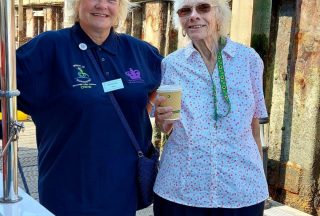We’re thrilled to share this lovely article by unpaid carer Tom, where he reflects on the life he shares with his wife. Tom beautifully captures their adventures together and highlights the innovative technology that allows them to explore the world while also enjoying the comforts of home.
‘It’s around 25 years since I first found myself being labelled a carer. My wife had been diagnosed a few years earlier with muscular dystrophy. This is a debilitating hereditary disease that affects the muscles. It’s a bit like your muscles ageing faster than they should resulting in the loss of strength in your arms and legs. Early symptoms were that my wife was finding it difficult to ride a bike. Then walking any distance and carrying items such as shopping became more of a task.
At first I helped with lifting and fetching things but as the years have progressed I have taken on board many of the things she took in her stride. Cooking being one of the things I have learned courtesy of Carer Support Dorset’s sister organisation Carers Support Wiltshire. At first, she only used a stick and a wheelchair, then a mobility scooter and rollator.
However, it has not stopped us from travelling and visiting many places both here and abroad. We have visited places such as Singapore, China, Australia, New Zealand, Fiji, Europe and the USA – we even managed to go above the Artic Circle right up to the Russian border! We visited the Ice Hotel – completely made of ice blocks, including the beds and you can sleep there, the temperature when we were there was minus 14c.
We have been on many adventures including exploring a nuclear bunker under a Cathedral in Norway, taking ski lifts to the Col di MIDI in the snow, sailing around the Farne Islands, exploring Pompeii and Herculean and all in a wheelchair! Some of the pavements in Pompeii were so difficult to negotiate she had to be lifted in her wheelchair to cross the roads. We have also toured most of the British Isles including the Outer Hebrides in our Motorhome.
I have to say we have done this as a team. Together we have worked out how we can make life easier for both of us. Before, I would just sit down and my wife would ask for the light to be switched on or off. So up I would get and switch the light on. Sit down again. Can you switch the radio on please? Up again. Switch the radio on. Sorry can you switch it off now and put the heater on. Up again. Down again and so it would go on. It does not seem much when you see it in writing but when you are tired, and a bit frustrated it seems a bigger problem than it really is.
So what was the solution? Well Amazon provided the answer with its Alexa Echo. It was so easy to program it with its associate plugs to switch lights and appliances on and off with a voice command. Now my wife can control most of the lighting throughout the house. She can ask for her electric blanket to be switched on before she goes to bed whilst she watches TV in the lounge.
Other useful tools that come with the Echo include that it can be used as an intercom throughout the house. It can read you the news headlines, give you the weather forecast and of course play the radio or stream music and video for you.
Another feature is that these devices are super sensitive to hearing your voice – should my wife fall anywhere in the house she can simply call out and ask Alexa to call me immediately. Our house has a number of these devices throughout, so she is never far from help.
We also have cameras linked up so we can see who is at the front door and communicate with them should the need arise. We also have them placed around the house which allows us to monitor the house even when we are away on our travels. Should an odd noise occur, such as breaking glass, the cameras record the event and alert us directly.
Technology has advanced so quickly and there are so many apps and gadgets out there to make your life easier for both the carer and the person being cared for. We both enjoy a full and varied life and try not to let her disabilities depress her. It can be extremely difficult and frustrating for her to find that even the simplest task of shopping turns out to be quite an effort to accomplish and not one she can do on her own.
As for the carer – well it too can be very frustrating. It’s like living two lives at once. But I’m very fortunate in having a wife that understands that too. For my 70th she bought me a wee dog. He takes me for a walk twice a day. I talk to him, and he agrees with everything I say!
So, at the end of the day, I have found that talking, compromise, a dog and a bit of useful technology are great helps in being a long-term carer. As the priest said when we got married in Paris 55 years ago “in sickness and in health”.’



